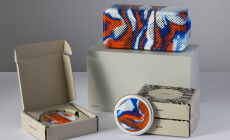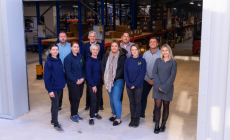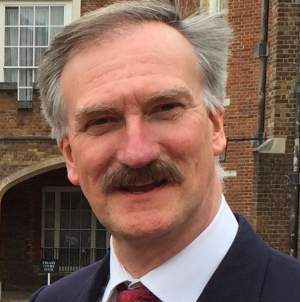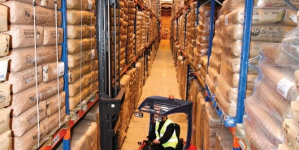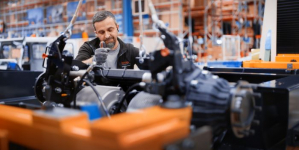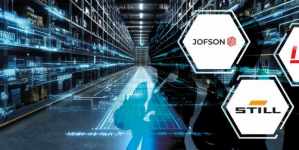-
GOPLASTICPALLETS.COM AND GOMI TEAM UP TO CREATEINNOVATIVE TECH FROM END-OF-LIFE PALLETS - 20 hours ago
-
Nulogy Introduces the Manufacturing Operating System - February 27, 2026
-
Bliss Direct scales to 300 daily orders and saves 25 hours per week with Forterro’s Orderwise ERP - February 25, 2026
-
Wootzwork raises $6.6M to bring predictability to offshore manufacturing - February 25, 2026
-
Rite-Hite unveils new range of hydraulic kits to upgrade and extend dock leveller performance - February 19, 2026
-
REWE and Cimcorp automate fresh supply chain for Berlin supermarkets and stores - February 19, 2026
-
Q1 – A recovery period or time to fix, switch and scale? - February 19, 2026
-
NULOGY’S SHOP FLOOR SOFTWARE TO POWER COMPLETE CO-PACKING’SOPERATIONS - February 13, 2026
-
Why lead generation depends upon good content - February 13, 2026
-
Wallapop and Albatross Sign Strategic Partnership to Bring Real-Time AI Discovery to the Future of Consumer-to-Consumer Commerce - February 12, 2026
Time, power and water savings for Daimler Mercedes – Benz after choosing NexSysTPPL batteries from EnerSys
EnerSys NexSys TPPL (Thin Plate Pure Lead) technology batteries, have been chosen by Daimler Mercedes–Benz as they offer fast charging, opportunity charging and zero battery change capabilities that deliver significant operational benefits, safety and lifetime cost savings compared with traditional flooded and gel battery alternatives. The NexSys range is suitable for an extensive range of vehicles including lift trucks, order pickers, pallet trucks, Automated Guided Vehicles /Laser Guided Vehicles and cleaning machines.
Mercedes Benz in Bremen is the second largest Mercedes automotive factory in Europe and produces more than 300,000 vehicles per year. Recently they built a new production hall. Their aim was to reduce the number of battery changes for their forklift fleet and to close the charging rooms in favour of decentralised charging near the production line. This posed a challenge however, as charging gases and acid aerosols cannot be allowed to contaminate the vehicle production environment, traditional flooded batteries couldn’t be used.
The emergence of a new type of lead-acid battery using TPPL technology now offers a practical, affordable and environmentally friendly alternative to conventional batteries and Lithium-ion designs. It offers significant operational benefits such as the ability to charge repeatedly from any depth of discharge (up to 80%) without affecting the condition of the battery. Moreover the increased reliability and elimination of water loss ensures that TPPL batteries are very low maintenance and cost-effective.
EnerSys offered the solution with its NexSys TPPL batteries with absorbed electrolyte as a virtually maintenance-free technology. As they are completely sealed, the creation of oxyhydrogen is minimised and the formation of acid aerosols is completely eliminated.
TPPL builds on the proven capabilities of traditional lead-acid batteries with some significant technological advances. In traditional lead-acid designs the positive and negative plates are typically over 4mm thick but with TPPL they are much thinner, circa 1mm. More TPPL plates can therefore be fitted in any given size of enclosure which in turn increases the total surface area available, providing inherently higher volumetric and gravimetric energy and power density than conventional units of the same size.
The other significant difference with TPPL is that the conductive grid is manufactured using lead that is much purer (typically 99.99% pure) than in conventional designs. This purity results in significantly reduced side reactions within the electrochemistry, which leads to improvements in charge acceptance and cyclic capabilities of the batteries. It also ensures the plates are much less likely to corrode and have longer shelf-life while extremely high recombination levels ensure water losses during recharge are minimised to provide optimum life.
A major advantage of this advanced technology is that the need to exchange a battery with a fully charged replacement at the end of the shift can often be eliminated. “In automotive manufacturing there is always the problem that batteries must be changed. This takes time and it is potentially dangerous, posing risk of injury to the operators,” Christian Wessolowski, Sales Area Manager at EnerSys Motive Power, pointed out.
Instead, the TPPL battery can be recharged for short periods whenever there is an opportunity, such as when an operative is on a break or completing some task away from their vehicle. “We have on one side the power of a conventional flooded lead acid battery, on the other side, the reduced maintenance of a gel battery, used in a multiple shift operation. All this comes associated with a rapid charging system, which brings the batteries back to full charge within the shortest time,” Wessolowski said. “By switching to the new battery technology, over 24,000 battery changes at Daimler can be saved per year.”
In addition to being cost-efficient, safer and virtually maintenance-free, NexSys batteries are also environmentally friendly. Up to 90 per cent of the materials used in lead-acid batteries can be recycled. As Daimler found out, choosing TPPL technology resulted also in saving 21,750 litres of water, and 247,500 kwH of electricity.
EnerSys is the only manufacturer to offer batteries with TPPL technology for motive power applications.


